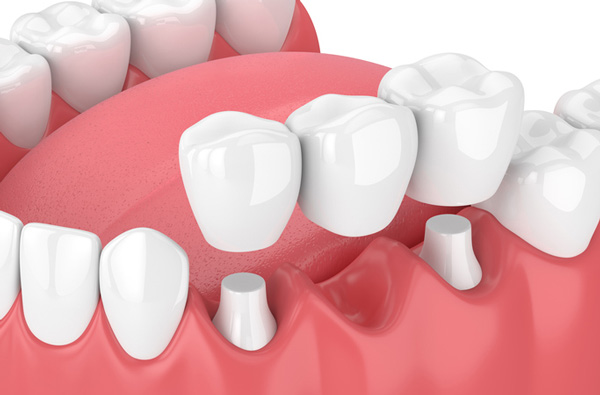Custom Implant-Supported Bridges Dental implants are considered a successful tooth replacement option. A single missing tooth can be replaced by a single implant with a dental crown on top of it. However, when a person is missing multiple consecutive teeth, placing one dental implant for each missing tooth can be very expensive and time-consuming for the patient. In this situation, an implant-supported bridge is a far more affordable option. We can create a custom implant-supported bridge for you here at Durham Prosthodontics. Dental implants are considered a successful tooth replacement option. A single missing tooth can be replaced by a single implant with a dental crown on top of it. However, when a person is missing multiple consecutive teeth, placing one dental implant for each missing tooth can be very expensive and time-consuming for the patient. In this situation, an implant-supported bridge is a far more affordable option. We can create a custom implant-supported bridge for you here at Durham Prosthodontics.What Are Implant-Supported Bridges?Dental implants replace missing tooth roots and preserve the jawbone by preventing bone degeneration. Implant-supported bridges are similar to traditional dental bridges, but instead of using adjacent healthy teeth to attach the dental crown, they use dental implants to support a bridge on top of them. Implant-supported bridges use small titanium posts, a metal that is highly biocompatible, to provide a permanent and functional replacement of multiple missing teeth. An implant-supported bridge is characterized by a pontic crown in the middle, having no roots. The pontic crowns are surrounded by retainer or anchor crowns, which are two or more two dental crowns attached to implants fused with the jawbone. How Long Does an Implant-Supported Bridge Last?Implant-supported bridges can provide a permanent solution for teeth replacement for 20 or more years. This durability and lifelong functionality are not present in traditional bridges, which need replacement every five to 10 years. What Is the Difference Between Implant-Supported Bridges and Traditional Bridges?The most important difference between the two options is the procedure. Implant-supported bridges first need an implant surgery which is followed by three to six months of recovery and bone healing. Implant-supported bridges require more time than traditional bridges. Traditional bridges have one major drawback, and that is the reduction or filing down of adjacent teeth for the attachment of dental crowns. This procedure damages the adjacent healthy teeth. What Is the Disadvantage of Implant-Supported Bridges?Implant-supported bridges have disadvantages similar to regular dental implants. They are placed during surgery, and people with gum disease and weak jawbones might not be eligible for the procedure. The procedure can take up to six months to complete, from initial consultation, implant placement, and crown placement, and some patients might not be willing to dedicate that much time to receive implant-supported bridges. What Are the Benefits of Implant-Supported Bridges?Implant-supported bridges have many advantages over traditional bridges. They protect the jawbone from atrophy as the bite force stimulates the jawbone and protects it from resorption and degeneration. In this way, the cosmetic appearance of the individual is maintained, which improves their confidence and self-esteem. Traditional dental bridges do not replace the roots of teeth, which means there is no bone stimulation. So, in the long run, the jawbone starts to recede, which can also affect the health of other remaining teeth in the mouth. At Durham Prosthodontics, our dentists Drs. Cunningham and Gazdeck and recommend custom implant-supported bridges as a better alternative to traditional bridges. If you would like a consultation to determine which option might suit you best, you can call (919) 489-8661 to schedule an appointment. |

Contact Information3709 University Dr Suite D Durham, NC 27707-6224 (919) 489-8661 info@mydurhamdentist.com Follow Us |